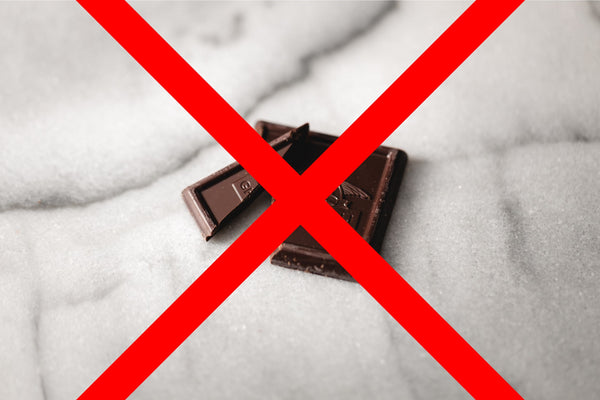
A lot of pet owners don’t realize that many household items are poisonous to dogs. Just as you child proof a home when kids are around, it’s also important to do some dog-proofing.
Things that are toxic to dogs and cats may be in your kitchen, your garage, and even your yard. This guide is designed to help you make sure that the poisonous items for dogs are kept up and out of reach!
While our list is not comprehensive, we did try to cover the most common items that are poisonous to dogs that many people may have in their homes.
ASPCA Pet Poison Helpline
If you think your dog may have ingested a household item that is poisonous to dogs:
Before we dive into what is toxic to dogs, we want to be sure you have the number for the ASPCA Pet Poison Helpline. If you are not sure if your dog or puppy has eaten something poisonous, please immediately call your veterinarian. If it is after hours, use this number to reach the pet poison helpline:
Household Items That Can Kill a Dog
Raw Dough
Raw bread dough, or yeast dough, contains yeast that is alive and active. Of course, the purpose of yeast in baking is to create carbon dioxide, one of the waste products of yeast, which can continue to be active in your dog’s warm stomach.
If a dog ingests too much raw dough it can create excess gas in the stomach which can not only be painful, but it can sometimes cause the life-threatening emergency known as Bloat in dogs.
Yeast is also known to create another waste by-product that is potentially toxic to dogs: Alcohol. If allowed to ferment in the stomach, even small amounts of raw dough could produce a dangerous amount of alcohol which could threaten your dog’s health.
Alcohol and Other Drugs
Alcohol and recreational or medicinal drugs are among the more common causes for dog deaths by poisoning each year. Do not assume that a drug is safe for dogs just because it’s safe for humans.
Recreational and pharmaceutical drugs need to be kept out of your dog’s reach. Over-the-counter medications, while perfectly safe for people, can be toxic to dogs due to their different digestive systems. Always consult with your vet before giving your pet over-the-counter medications designed for humans.

Coffee, Soda, Caffeine, and Chocolate
Theobromine and caffeine are two compounds found in chocolate that affect the central nervous system and circulatory system in dogs. Dogs are more sensitive than people to these compounds, and even small amounts of chocolate (or other foods high in caffeine) can create stomach problems, high blood sugar levels, liver failure, kidney failure, or death in our canine companions.
A related dangerous product is nicotine, found in high doses in cigarettes and chewing tobacco. E-juices, which often have enticing flavors, are also extremely dangerous when it comes to potentially poisoning your dog. Be sure to keep these products out of the reach of your furry friend.
Onions, Garlic, and Leeks
Plants in the Allium genus contain organosulfides, a family of compounds that can be dangerous to our pets, even in small doses. These compounds can cause changes in red blood cells that result in anemia.
Symptoms can appear days after ingestion and include weakness, lethargy, rapid breathing (or panting), high heart rate, pale color of soft mouth tissues, and reddish or brown urine.
Grapes, Currants, and Raisins
Not all dogs are reactive to grapes and raisins. However, for a small minority of dogs grapes and raisins can be extremely toxic, even fatal in small doses on some occasions. Researchers don’t really understand why this reaction happens, only that a small number of dogs seem to have it.
Even if you have fed a dog grapes safely in the past, don’t assume they are safe. Since raisins are used in many baked goods, be sure to avoid keeping baked goods in reach of your pooch.
Macadamia Nuts
Not fully understood by scientists, macadamia nuts can cause a deadly reaction for some dogs. Please avoid giving your dog macadamia nuts.
Just like people, dogs can develop deadly nut allergies. Many people err on the safe side and avoid giving nuts of any kind (with the exception of peanut butter) to their dogs to avoid the chance of a deadly allergic reaction.

Artificial Sweeteners (Especially Xylitol)
Avoid giving your dog any foods with artificial sweeteners. Sugar-free products are particularly dangerous. Pay particular attention to products that contain Xylitol, which has now been shown to be fatally toxic for dogs. It can cause acute hypoglycemia and/or liver failure even in very small doses.
Rich Fatty Foods
While it might be okay to give your pooch a small portion of fatty foods such as chicken skin, please be aware that large amounts (proportionate to the size of your dog) can result in a serious and potentially life-threatening disease known as pancreatitis.
Poisonous Household Products Toxic to Dogs
Cleaning Products
Common cleaning products such as bleach, detergents, antibacterial cleaners, and more are potentially toxic to your dog.
In fact, many detergents use Borax as the basis for their cleaning power. Sweet in taste, many pets can be tricked into eating this powder with fatal consequences. Despite the fact that it is a natural substance, Borax is nonetheless deadly to dogs. Animal poisoning occurs when pets get under the sink or into closets where owners keep cleaning supplies.
Heavy Metals
There are many sources of deadly heavy metals in the average household. Paints, solvents, plumbing materials, golf balls, and linoleum tiles are just some of the common household items that can contain dangerous amounts of heavy metals.

Automotive Oils, Liquids, and Other Chemicals
The garage is another great place to be pet-proofing if you are concerned about toxic items that your canine could get into. Many of the liquids (gas, oil, anti-freeze, rat poison, etc) used in car care are potentially toxic to your pooch. The ethylene glycol in anti-freeze, for example, could be fatally toxic.
Keep your garage picked up and store chemicals out of reach to keep Fido safe.
Toxic Plants and Other Hazards for Dogs in Your Yard
Plants to Protect Your Dog From
There are many common garden plants and, in some cases, houseplants that could poison your dog. Note that not all of the plants listed below are likely to cause death. However, they may cause gastrointestinal upset, drooling, lethargy, or other symptoms. Some can also be fatally toxic.
Be sure to restrict your pet’s access if you have any of these plants:
|
Amaryllis Apple Tree Apricot Tree Asparagus Fern Autumn Crocus Bead Tree Begonia Bleeding Heart Burning Bush Buttercup |
Castor Bean Chamomile Cherry Tree Chives Chrysanthemum Clematis Cyclamen Daffodil Foxglove Garlic |
Geranium Gladiola Hops Hosta Hydrangea Iris Ivy Laceflower Larkspur Leeks |
Lily Lily of the Valley Marijuana Monkshood Morning Glory Oleander Onions & Shallots Peach Tree Periwinkle Plum Tree |
Primrose Rhubarb Star of Bethlehem Sweet Pea Tomato Plants Tulip/Narcissus Winterberry Holly Wisteria Yarrow Yew |
Rotten Fruits
Do you have a fruit tree in your yard? While many fruits are safe for our pets, many pet owners don’t realize that when fruit falls from the trees and is allowed to rot, dangerous levels of alcohol can be present.
You may have noticed that some animals, such as deer, will seek out these rotten fruits and may even get “drunk” from them. However, don’t allow your dog to get at overripe fallen fruit because engorging on the alcohol present could cause a fatal overdose.
Hops
Are you a home-brewer? While it might be nice to make your own custom beers, please be sure that you keep your hops out of reach of your pets, whether you buy them or grow them. Hops contain vital compounds that can cause serious, even deadly complications when metabolized by dogs.
Mushrooms
Keep an eye out for fungus growing in your yard. Although many mushrooms are non-toxic to pets, some very common mushrooms found in our yards are extremely deadly to both people and pets.
If you find that your dog has ingested mushrooms in your yard or on the trail, be sure to try and collect some samples before taking your furry friend to the veterinarian for care. This can make a big difference in terms of the treatment options available to your pet.
Pesticides, Herbicides, and Other Lawn Chemicals
Many of the products used in lawn and garden care include toxins designed to kill pests, weeds, or other living organisms such as fungus. Fertilizers can also be dangerous.
Dog owners should consider all of these products as potentially toxic to their pets and restrict access during and after treatment of specific areas. Keep in mind that your canine can pick up residues on their fur that they will later ingest when they lick their paws. Poisoning from such behavior after a recently treated lawn is, sadly, not uncommon.
Cocoa Mulch
Although this mulch can be a beautiful addition to your landscape, it is best to avoid it if you have a dog who has access to your gardens and flower beds. Made from by-products of the cocoa industry, like chocolate, the mulch contains dangerous compounds that are toxic to dogs.
References:
https://www.aspca.org/pet-care/animal-poison-control
https://pets.webmd.com/dogs/gastric-volvulus-bloat-dogs#1
https://www.frontiersin.org/articles/10.3389/fvets.2016.00026/full
https://www.vetsmall.theclinics.com/article/S0195-5616(11)00219-1/fulltext


